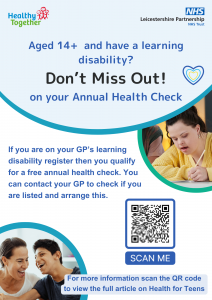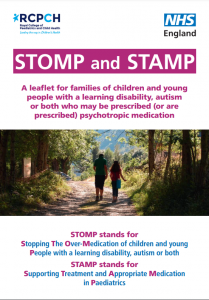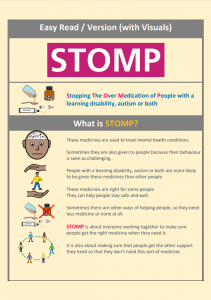- STOMP stands for: Stopping Over Medication of People with a learning disability and autistic people.
- STAMP stands for: Supporting Treatment and Appropriate Medication in Paediatrics.
- The STOMP and STAMP programmes aim to raise awareness so that people with a learning disability, autism or both are only prescribed the proper medication, at the right time and for the right reasons.
Psychotropic medicines affect how the brain works and include medicines for psychosis, depression, anxiety, sleep problems and epilepsy. Sometimes they are also given to people because their behaviour is seen as challenging.
People with a learning disability, autism or both are more likely than other people to be given these medicines. It is felt that these medicines are right for some people to help them stay safe and well. But sometimes there are other ways of helping people, so they need less medicine or none at all.
The STOMP and STAMP programmes give confidence to prescribers to ensure they work collaboratively with their patients and families and to ensure the right prescriptions are given – and only when absolutely necessary.
The video below highlights how multi-agency collaboration can help achieve the aims of these programs:
The programmes also aim to create confidence in patients and their families to consider what changes to medication might be appropriate – and how to do this, safely and effectively. Remember you will need to consult a doctor if you think you need any changes in your medication.
Here are some ideas that autistic people and their carers can do to help with medication use:
- Attend your annual GP health check – Click this link to view information on annual health checks.
- Have an understanding and a commitment to management, monitoring, and follow-up of the medication. This includes taking medication as prescribed.
- Ensure that the information on the medication is understandable and accessible (e.g. Do you know what it is for, how to use it, possible unwanted effects and how to report them, expected duration of treatment).
- Know how to identify reliable sources of information about the medicines and treatments – don’t use a search engine to make a decision about treatments.
- Ensure that you know what to do if there are any concerns about the management of the condition if the condition deteriorates or if there is no improvement in a specific time frame.
- If possible, take responsibility for medicines and self-manage the conditions by seeking support and advice from the pharmacy.
- Be aware of new symptoms and side effects and keep a diary to help you remember.
- Be honest with professionals about your medication – missing doses, taking more to manage pain, taking illicit drugs, taking supplements (including nutritional).
- Some prescribed medications can be addictive after long periods of use be aware of addiction and how you could prevent this with medications like opioids.
- If there is anything you are not sure about, always ask a medical professional (e.g. if you are not sure what your medication is for or how or when to take it, or you have any worries about your medication, talk to your doctor).
The guide below is for families whose loved one has been prescribed medication and it recommends what questions to ask and where to find more support:
Click this link to view the family guide
In essence STOMP and STAMP are about helping people to stay well and have a good quality of life.
The STOMP Easy Read document below has been co-created by our lived experience partner ‘RstaSha’ and the LLR STOMP/STAMP working group:
Click this link to view Easy Read STOMP information
_____________________________________________________________________________________________________________________________________________________________
For our directory of health related resources and services, please click here
_____________________________________________________________________________________________________________________________________________________________






